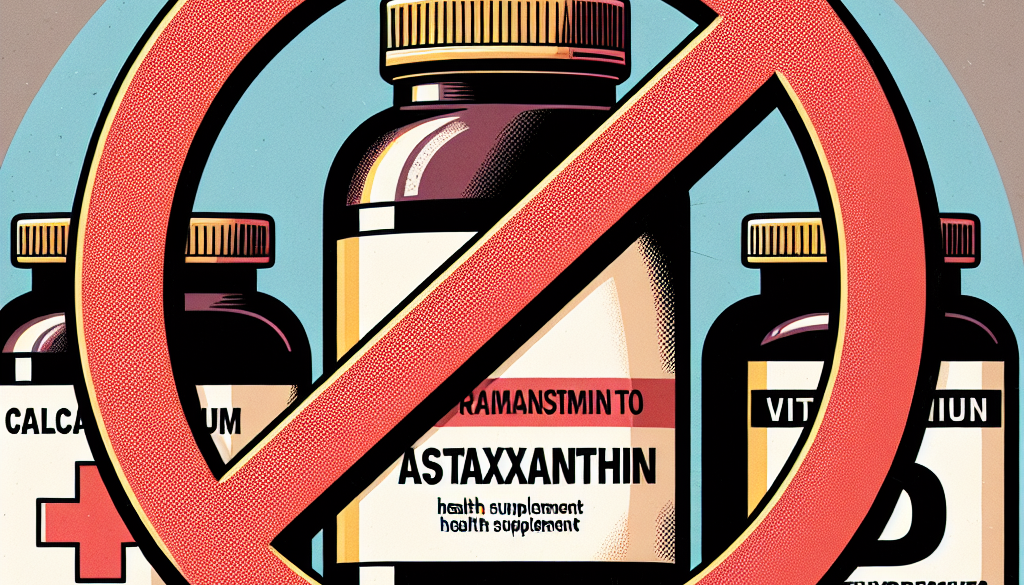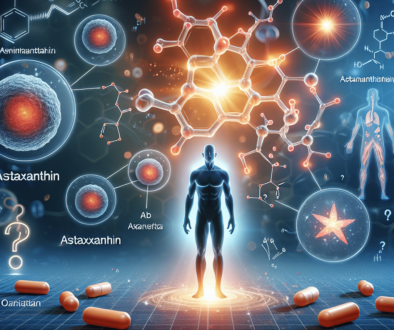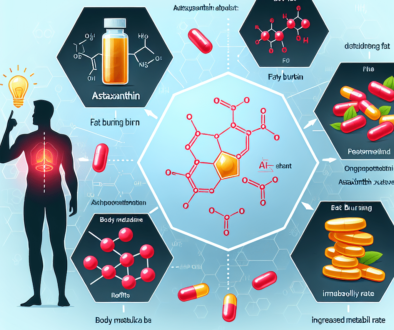What not to take with astaxanthin?
-
Table of Contents
- Astaxanthin Interactions: What Not to Take with This Potent Antioxidant
- Understanding Astaxanthin
- Potential Interactions with Medications
- Supplements and Nutrients to Avoid
- Food Interactions
- Precautions for Specific Populations
- Case Studies and Research
- Conclusion: Key Takeaways on Astaxanthin Interactions
- Enhance Your Health with ETprotein’s Premium Protein Products
Astaxanthin Interactions: What Not to Take with This Potent Antioxidant

Astaxanthin, a naturally occurring carotenoid found in certain marine plants and animals, has gained popularity as a dietary supplement due to its potent antioxidant properties. It’s known for its potential to support skin health, enhance visual acuity, and provide a boost to the immune system. However, as with any supplement, it’s crucial to understand how it interacts with other substances. In this article, we’ll explore what not to take with astaxanthin to ensure safety and efficacy.
Understanding Astaxanthin
Astaxanthin is a keto-carotenoid that gives salmon, shrimp, and flamingos their distinctive pink and red hues. It’s also available as a supplement, derived mainly from the microalgae Haematococcus pluvialis. Astaxanthin’s antioxidant capabilities are said to be much stronger than those of other carotenoids and even vitamin E.
Potential Interactions with Medications
When considering the use of astaxanthin supplements, it’s essential to be aware of potential interactions with certain medications:
- Anticoagulants and Antiplatelet Drugs: Astaxanthin may have a blood-thinning effect, which could potentially increase the risk of bleeding when taken with anticoagulants like warfarin or antiplatelet drugs such as aspirin.
- Antihypertensive Drugs: There is some evidence to suggest that astaxanthin might lower blood pressure. This could lead to an additive effect when taken with blood pressure-lowering medications, potentially causing hypotension.
- Immunosuppressants: Given its immune-boosting properties, astaxanthin might reduce the effectiveness of medications designed to suppress the immune system.
It’s always recommended to consult with a healthcare provider before adding astaxanthin to your regimen, especially if you’re on medication.
Supplements and Nutrients to Avoid
While astaxanthin is generally considered safe, combining it with certain supplements may not be advisable:
- Other Antioxidants: While antioxidants are beneficial, there is a theory that too many can lead to an imbalance and potentially reduce the benefits. It’s important to balance your intake and not overconsume.
- Herbal Supplements: Some herbal supplements might also have blood-thinning or blood pressure-lowering effects, which could be amplified when taken with astaxanthin.
Again, discussing your supplement routine with a healthcare professional is the best course of action.
Food Interactions
Food interactions with astaxanthin are not well-documented, but it’s worth noting that carotenoids are best absorbed with fat. Therefore, taking astaxanthin with fatty foods can enhance its bioavailability. Conversely, a diet low in fats might reduce the absorption of astaxanthin.
Precautions for Specific Populations
There are certain populations who should exercise caution with astaxanthin supplementation:
- Pregnant and Breastfeeding Women: There is insufficient research on the effects of astaxanthin in pregnant or breastfeeding women, so it’s best to avoid use.
- Children: The safety of astaxanthin supplements has not been established in children.
- Individuals with Hormone-Sensitive Conditions: Astaxanthin might have an effect on hormones, potentially affecting conditions like breast cancer or prostate cancer.
Consulting with a healthcare provider is particularly important for these groups.
Case Studies and Research
While research on astaxanthin is ongoing, some studies have highlighted the need for caution when combining it with other substances. For example, a study published in the journal “Marine Drugs” suggested that astaxanthin might potentiate the effects of anticoagulant therapy, indicating a need for careful monitoring.
Conclusion: Key Takeaways on Astaxanthin Interactions
In summary, while astaxanthin is a powerful antioxidant with many potential health benefits, it’s important to be mindful of what you take it with. Avoid combining it with blood-thinning medications, blood pressure-lowering drugs, and excessive other antioxidants. Always consult with a healthcare provider before starting any new supplement, especially if you have pre-existing health conditions or are taking other medications.
Enhance Your Health with ETprotein’s Premium Protein Products
If you’re looking to complement your health regimen with high-quality protein, consider ETprotein’s range of organic bulk vegan proteins and L-(+)-Ergothioneine (EGT). Their products are non-GMO, allergen-free, and come in various forms to suit your dietary preferences. Whether you’re involved in sports nutrition, weight management, or general health and wellness, ETprotein has a protein solution for you.
About ETprotein:
ETprotein, a reputable protein and L-(+)-Ergothioneine (EGT) Chinese factory manufacturer and supplier, is renowned for producing, stocking, exporting, and delivering the highest quality organic bulk vegan proteins and L-(+)-Ergothioneine. They include Organic rice protein, clear rice protein, pea protein, clear pea protein, watermelon seed protein, pumpkin seed protein, sunflower seed protein, mung bean protein, peanut protein, and L-(+)-Ergothioneine EGT Pharmaceutical grade, L-(+)-Ergothioneine EGT food grade, L-(+)-Ergothioneine EGT cosmetic grade, L-(+)-Ergothioneine EGT reference grade and L-(+)-Ergothioneine EGT standard. Their offerings, characterized by a neutral taste, non-GMO, allergen-free attributes, with L-(+)-Ergothioneine purity over 98%, 99%, cater to a diverse range of industries. They serve nutraceutical, pharmaceutical, cosmeceutical, veterinary, as well as food and beverage finished product distributors, traders, and manufacturers across Europe, USA, Canada, Australia, Thailand, Japan, Korea, Brazil, and Chile, among others.
ETprotein specialization includes exporting and delivering tailor-made protein powder and finished nutritional supplements. Their extensive product range covers sectors like Food and Beverage, Sports Nutrition, Weight Management, Dietary Supplements, Health and Wellness Products, and Infant Formula, ensuring comprehensive solutions to meet all your protein needs.
As a trusted company by leading global food and beverage brands and Fortune 500 companies, ETprotein reinforces China’s reputation in the global arena. For more information or to sample their products, please contact them and email sales(at)ETprotein.com today.











